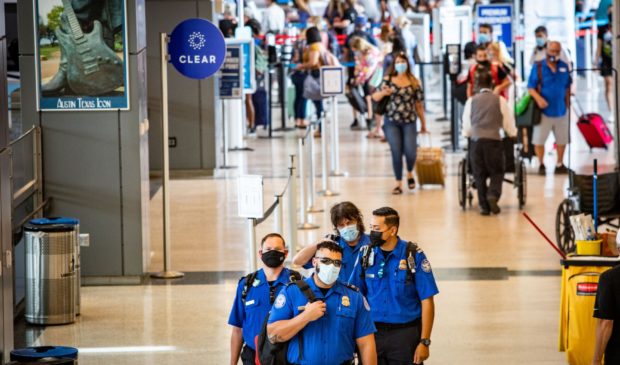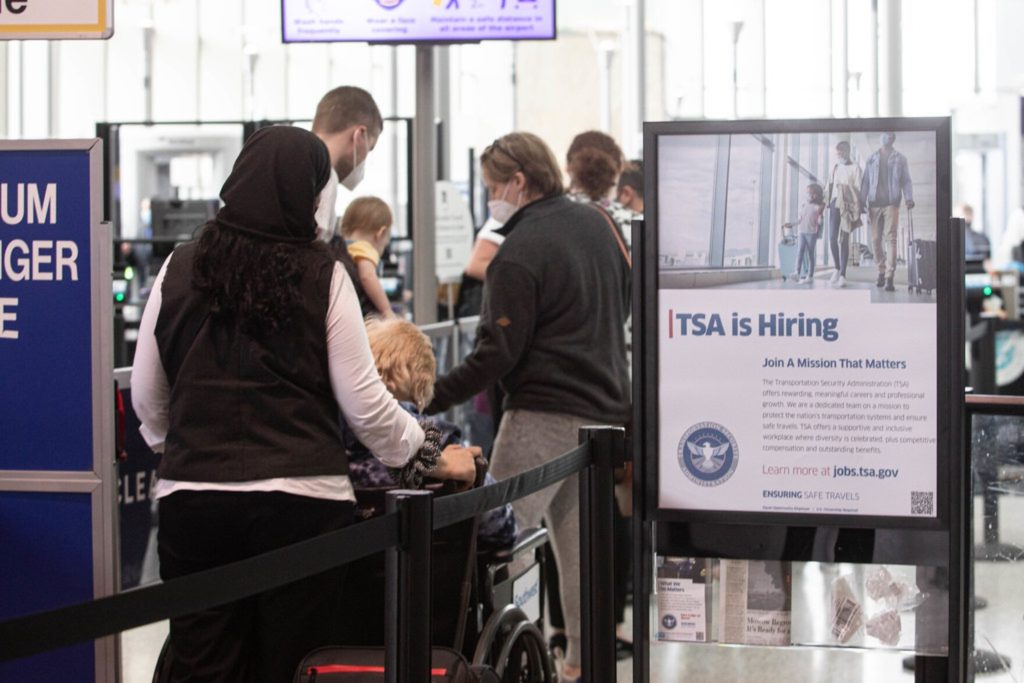The early morning lines at Austin’s airport are gaining notoriety even among NPR game show hosts.
“I fly a lot, and I often take early flights. I have never anywhere been in an airport that crowded that early in the morning,” Peter Sagal, host of the weekly news quiz Wait Wait… Don’t Tell Me!, said after catching a flight Monday morning at Austin-Bergstrom International Airport.
Airport staff was bracing for more than 30,000 passengers to fly out.
“It was just crazy. I couldn’t believe how many people were there,” Sagal said. “The line to get into the security line extended out the exterior doors onto the sidewalk.”
The lines are typically at their worst Thursdays through Mondays before 8 a.m., a problem caused by airlines adding more flights without enough Transportation Security Administration agents to screen passengers in under 30 minutes.
The TSA won’t give specific employee numbers for AUS, citing security concerns, but it acknowledges the airport has been short-staffed. The agency has offered hiring bonuses of up to $2,000 for months and has brought in workers from the National Deployment Force, a TSA office meant to send extra help when airports need it.
Behind-the-scenes frustration over TSA staffing blew out into the open over the weekend when a top official appointed by Council Member Pio Renteria to oversee the airport said the situation was so dire it could force the airport to cut back on direct flights.
“TSA is seriously understaffed and unable to pay a competitive wage,” Austin Airport Advisory Commission Chair Eugene Sepulveda tweeted Saturday.
“Agents are refusing to move to Austin and are resigning. TSA is losing more agents than they are able to hire,” he continued. “We will have to reschedule routes and cut back direct flights if the situation continues.”
Sepulveda directed KUT’s questions to the airport’s communications office, which remained tight-lipped about TSA staffing. It directed inquiries to the federal agency and quickly sought to tamp down expectations that any flights would be canceled.
“There is no precedent for the airport canceling or denying flights due to TSA staffing challenges,” airport spokesperson Sam Haynes said in an email. “The 17 TSA lanes across the four checkpoints can accommodate the volume of passengers. The Department of Aviation does not cancel flights.”
The TSA, meanwhile, fired back at Sepulveda’s claim that agents are refusing to move to Austin.
“That is NOT true,” TSA spokesperson Patricia Mancha wrote in an email. “Austin gets a fair share of voluntary transfers from all over the nation.”
“Like all other organizations and companies, TSA is in the process of hiring staff,” she said. “Our process is longer than that of other companies since we do an extensive background check and medical evaluation.”
Mancha in part blamed airport infrastructure for long early-morning lines. She said TSA forecast more than 3,200 passengers would come through its checkpoints next Monday, but it would need 22 lanes to process them.
“We only have 17 lanes, so the large number of passengers will obviously have to wait in line,” Mancha said.
But the TSA has struggled to keep the existing 17 lanes open at AUS. Last Monday morning, when TSA waits of over 90 minutes forced some passengers to rebook flights, the agency said it didn’t initially have enough agents to staff three new screening lanes airport staff opened late last year.
The TSA staffing situation at the airport is serious enough that city Aviation Department officials have asked TSA leadership to bring in even more emergency workers through the NDF. Local airport officials are also asking for help from Congress.
“The airport and TSA all need to be working together better and sooner to plan for events like this,” said U.S. Rep. Lloyd Doggett, a Democrat whose district includes AUS. “We don’t need finger-pointing back and forth. We need to solve the problem.”
Doggett pointed to President Joe Biden’s recommended budget for Fiscal Year 2023, which would increase TSA pay and benefits by about 29 percent to $7.1 billion. Doggett said he also supports House Resolution 903, a bipartisan bill to address high TSA turnover by offering front-line workers the same protections most federal employees already have.
“TSA workers have had many problems through the years and have felt they’ve been a second-class part of the federal workforce,” Doggett said.
Airport staff told the congressman last week that part of the problem was TSA had ended mandatory overtime right as the volume of travelers was increasing. An airport spokesperson said aviation staff had requested TSA do everything it can to help.
TSA’s Mancha said mandatory overtime is used off and on at the discretion of the federal security director at each airport based on need. TSA agents can be required to work up to six days a week.
“They’re not going to try to burn out their staff or make staff use mandatory overtime if there’s no need,” Mancha said.
But that very tool used to alleviate staffing shortages – mandatory overtime – could also be exacerbating them, according to union leadership.
TSA’s local union president did not respond to a request for comment Monday before this story was published.
But in the past, AFGE TSA Council 100 President Hydrick Thomas told KUT, inflexibility around scheduling mandatory overtime was causing people to leave TSA for other federal agencies, many of which pay better.
“How do you tell a single parent, we’re mandating you to come into work on your day off, and she has no one to watch the child?” Thomas said. “If the employees were getting paid decent wages, they wouldn’t mind working every day.”
This story was produced as part of the Austin Monitor’s reporting partnership with KUT. This story has been corrected since publication. Eugene Sepulveda was appointed to the commission by Council Member Pio Renteria, not Mayor Steve Adler, as was originally reported.
The Austin Monitor’s work is made possible by donations from the community. Though our reporting covers donors from time to time, we are careful to keep business and editorial efforts separate while maintaining transparency. A complete list of donors is available here, and our code of ethics is explained here.





